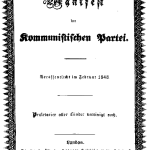The ten-point list from The Communist Manifesto, with my rough quantification:
 1. Abolition of property in land and application of all rents of land to public purposes.
1. Abolition of property in land and application of all rents of land to public purposes.
[Partial check: property taxes, zoning laws, the federal government alone owns 30% of all land in the USA. .6 points.]
2. A heavy progressive or graduated income tax.
[Check. 1 point.]
3. Abolition of all rights of inheritance.
[Partial check: inheritance tax rates range from 18% to 55%. .4 points.]
4. Confiscation of the property of all emigrants and rebels.
[No check. 0 points.] (See * below.)
5. Centralization of credit in the banks of the state, by means of a national bank with state capital and an exclusive monopoly.
[Check: Federal Reserve, US Treasury. 1 point.]
6. Centralization of the means of communication and transport in the hands of the state.
[Partial check: roads, airspace; controls on riverways, telecomm. .5 points]
7. Extension of factories and instruments of production owned by the state; the bringing into cultivation of waste lands, and the improvement of the soil generally in accordance with a common plan.
[Partial check, but very hard to measure rates of state-ownership or regulations in research, manufacturing, and agriculture. .5 points.]
8. Equal obligation of all to work. Establishment of industrial armies, especially for agriculture.
[No check: though suggestions of mandatory volunteerism and national service. 0 points.]
9. Combination of agriculture with manufacturing industries; gradual abolition of all the distinction between town and country by a more equable distribution of the populace over the country.
[No check. 0 points.] 
10. Free education for all children in public schools. Abolition of children’s factory labor in its present form. Combination of education with industrial production, etc.
[Check. 1 point.]
Total: 5 out of a possible 10 points.
Workers of the world, rejoice! We’re halfway there!
* Update: Neil Baxter informs me of new exit taxes for US expatriates, and Jeff Perren argues nicely that this ship has sailed too. So this should be a partial check, and we’re over 51% there.
I suspect #4 should get at least 0.3. First, ex-pats who are still U.S. citizens are still subject to U.S. income tax even if they earn zero income in the U.S. Second, there are talks, currently stalled but likely to bloom when more people leave the country over the next few years, about expropriating some part of the wealth of those leaving. The recent, highly publicized Facebook investor is a case in point.
Quibbles aside, it’s pretty scary isn’t it? It reminds me of Norman Thomas’ famous quote that the people will never openly embrace socialism but every program will ultimately be adopted.
There is an “exit tax” on all property exceeding $2M (including deferred-tax assets like pension plans). It’s complicated, but essentially you have to pay capital gains tax on your assets as though you had sold them at the time you renounce your citizenship.
I’d call that a 0.3.
Bears an uncanny resemblance to the Elders of Zion protocols?!?
I would imagine that #9 is a partial check as well. Looking at our suburban areas, where plots are settled individually as distinct from any neighbors, there seems to be an equable distribution of the populace over the land. This is in stark contrast to Germany where the populace is grouped together in towns and surrounded by their fields, which can then act as a demarcation between those towns.
Interesting point, Trapper. Do you think the US distribution reflects top-down government planning, as Marx would do it, or more bottom-up supply and demand? I don’t know one way or the other.
No 8. ‘Equal right of all to work’ was directed towards women and the promotion of feminism. Full point! (1.0)
Hi Janardan: Point 8 says equal “obligation” to work, not “right” to work.
Looks like a good start to me.
Then welfare work requirements would be socialism in your book. Certainly the New Deal was designed this way until the GOP created the final dole system that we have to day.
That depends on whether you consider local zoning laws as “top-down” dirigisme.